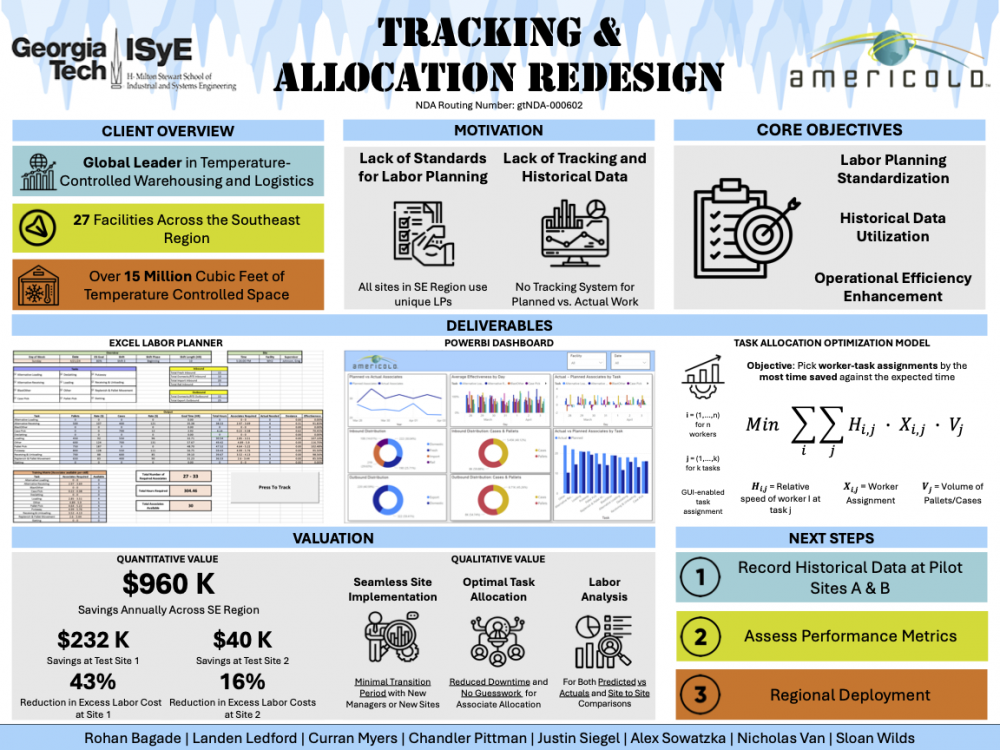Client Context
Americold Logistics, LLC, is a global leader in temperature-controlled warehousing and logistics solutions. They offer comprehensive supply chain solutions including cold storage, transportation, and integrated technology services. Americold processes trillions of pounds of perishable goods annually across its 240-plus facilities, encompassing 1.5 billion cubic feet of temperature-controlled storage worldwide, underscoring the critical need for efficient logistics solutions. Their services include but are not limited to, reverse logistics, tempering, label customization, and repacking to meet specific customer needs. They also serve a wide range of customers from producers, retailers, food service providers, and also directly to customers.
The system under study is Americold's current labor planning and task allocation process used across its facilities. Each facility employs a Warehouse Management System (WMS) that calculates the Goal Time (GT) required for an associate to complete a task, based on several factors such as type of machinery, distance traveled, and volume of product, incorporating the Physical Fatigue & Delay (PF&D) rate. The facilities operate with an On-Standard Goal (OS%) of 80%, aimed at ensuring each associate's work generates sufficient revenue, primarily through revenue-generating tasks.
Each facility uses its own personalized, Excel-based labor planner with no tracking capabilities, leading to difficulties in comparing predicted versus actual staffing needs and analyzing historical labor trends. Task allocation is primarily managed through a wave planning method, which lacks a data-driven approach, resulting in inefficiencies in worker utilization.
Project Objective
The client asked the team to standardize their labor planning process which involves a labor planner that can be used at any site regardless of warehouse capabilities. Additionally this planner should track a new metric, planned number of associates per shift in tandem with a PowerBI dashboard that compares this value with the actual number of associates who work a given shift.
The team sought to go one step further to optimize task allocation by utilizing historical data to determine the best associate and order to complete tasks to reduce overall time worked in an effort to reduce overtime costs.
Design Strategy
The team toured two sites, analyzed historical data, and asked many questions during the span of the project. Each deliverable was iterated through at least four times. Each new version was discussed as a team, with our faculty advisor, and the client.
The deliverables were testing against historical data to determine if an appropriate number of planned associates would be calculated and to see if overtime could have been reduced using the proposed task allocation model.
Deliverables
The first deliverable is a labor planner that can be used at any site regardless of warehouse capabilities and tracks the planned number of associates per shift.
The second deliverable is a PowerBI dashboard that links to the company's database to compare the current metric for 'actual associates used' to the new metric for 'planned associates.'
The final deliverable is an optimization model that determines the appropriate associate and tasks completion order to reduce the total number of hours worked per shift. This is implemented through a Graphical User Interface that was created for one of our test sites and can easily be changed to work at any other site.
Value and Impact
The value of the project can be demonstrated through quantitative and qualitative means. The estimated annual savings at the test sites are $40K and $230K while the estimated savings for the region is $960K. This was calculated by using the 43% and 16% reductions in excess labor cost at the test sites.
The implementation of the deliverables will minimize the downtime between management changes, reduce downtime between associate allocation task waves, and allows Americold to compare the planned versus actual associates used to identify future insights.

